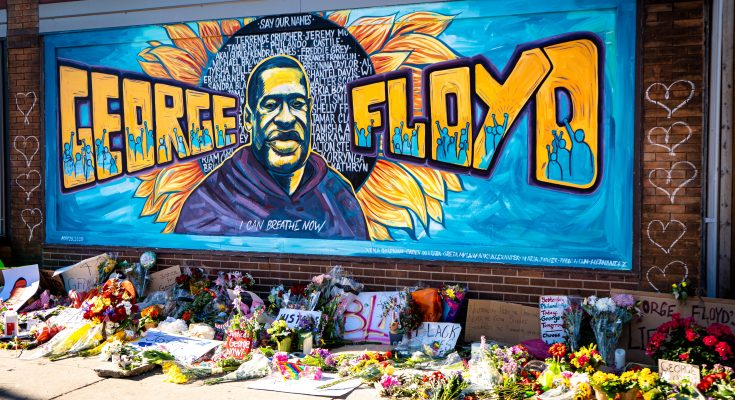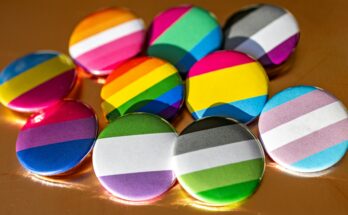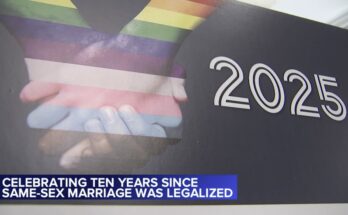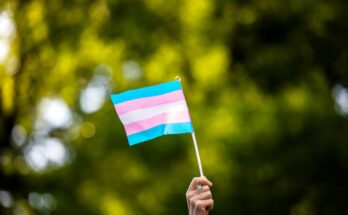The Black Lives Matter movement and why the LGBTQ community must speak up
I watched this week as companies, Instagrammers, bloggers, and my friends posted black squares, and Black Lives Matter slogans on social media while debating the pros and cons of #blackouttuesday. I remained silent.
I’ve never been one to jump on the internet bandwagon. I don’t rainbow-ify my avatars, I don’t put BuzzFeed quizzes on my Facebook page, and I don’t do TikTok challenges. This time was no different. I didn’t feel compelled to blackout my feed, nor did I feel like I had any right to share my opinions. Add to this the fact that some people were calling out others for doing it wrong and I wanted no part of it. Heaven forbid I be wrong online.
I got it terribly wrong.
I ran across a video of a police officer in Chicago calling a protester a faggot during an altercation. I was stunned and shocked and wanted to take out retribution on this man. This was the first time I was outraged since the news of George Floyd broke and the protests began.
I have been shocked, sad, scared, bewildered, empathetic, and so many other emotions. But I haven’t been outraged. And then I read the caption. It said, and I’m paraphrasing here, “To all you white gays who have remained silent. Well, get mad now.”
Now I was indignant. How dare you. How dare you tell me who I am and how I feel.
The problem is, he was right.
This was the first time I had felt anger, and I was mad as hell. Mad enough to want to join the protests. But, I soon realized it was only because I felt triggered. It felt personal. It took a complete stranger on the internet to call me out on my bullshit.
Now I felt shame. I had to ask myself, “Am I a hypocrite?”
I remember the days I stood shoulder to shoulder with my brothers and sister, demanding the right for same-sex marriage. I remember being so angry with a state senator for pandering to me during a rally. For not hearing what I had to say. How could I make this straight guy understand my point of view?
Flash forward to 2020 and I still feel indignation when I’m not heard as a gay man. I still feel that gut punch at hearing faggot used as a pejorative. How could I not be irate over the killing of a fellow human being?
Here’s the thing, as I write this I realize that I am mad as hell. I just don’t know what to do. I feel like this isn’t my experience, so this isn’t my fight. I literally don’t know where to start. And, let’s be honest, it’s easier to do nothing than to start an uncomfortable conversation about race.
But this is the type of attitude I’ve been railing against my whole life in the LGBTQ community. This “not in my back yard” attitude is bullshit, and we, as non-black citizens need to stop, listen, and take action.
Pride started as a riot.
As a member of the LGBTQ community, this is important to hear. What we celebrate as Pride today, started as a series of riots. A series of riots led by black and brown trans women, to be precise. A fact that many of us have forgotten, never knew in the first place, or choose not to acknowledge. And a good reminder that the LGBTQ community includes members of the black community, another fact that often gets overlooked.
Fifty years has allowed us to reframe how we view the events at Stonewall and to start calling these actions a revolution or an uprising. But make no mistake, this was civil unrest, marked by clashes with police, fires, damage to property, looting, and arrests. Sound familiar?
Members of the black community are asking for — no, demanding — the same thing the LGBTQ community was demanding all those years ago: to be heard. While this may not be our experience, it is our fight. And we can put ourselves in the place of our fellow humans not by asking to be understood, but to ask instead, “how can I understand someone else’s point of view?”
What we’re talking about is simple, human empathy.
I’ve heard a lot of opinions on ways to help make sense of what’s happening but, the most striking for me has been the advice from Jamil Smith, a senior writer at Rolling Stone. In an episode of the Code Switch podcast Smith says this of black Americans killed by police:
I think, you know, that everybody who is listening needs to go and look up these people. Look at their names, look up their stories, understand what happened to them.
This is, after all, how human beings connect with each other, through story. By seeing ourselves in the stories of others we can start to have empathy for their struggle. The LGBTQ movement was born of struggle and we need to take that collective experience and apply some empathy for our black brothers and sisters.
It’s time to take action.
Writing this has been a first step for me. I’ve written this as a call to the LGBTQ community, as much as it is a reminder to myself that I am not exempt from this fight. We cannot — I cannot — in good conscience, celebrate Pride month and ignore the pleas of the African American community. They are calling for our support and we need to answer that call.
Things you can do, right now, to make a difference.

We’ve compiled a list of things you can do right now. This is by no means a comprehensive list and we will be adding to it as we find more resources. Have something you’d like to add? Leave a comment below and we’ll put it on the list.
Listen to some stories
First stop, go listen to “A Decade Of Watching Black People Die” on Code Switch. The episode is sobering and the fact that Jamil Smith’s essay was written five years ago is disturbing. In his words, “I’m astonished by how much of it could be put in a column today.”
Action Items
Some next steps you can take.
- Register to vote
- Check-in on your black friends, family, partners, and colleagues
- Educate yourself on what it means to be anti-racist (Google Doc with resources)
- Share and repost your sources of education to help others
- Don’t center the narrative around you. Identify privilege and condemn it.
- Continue to donate to and support Black Lives Matter initiatives after the protests
- Stop supporting organizations that promote hate
Stay informed
Follow these Instagram accounts for updates on the Black Lives Matter movement.
- @blacklivesmatter
- @colorofchange
- @naacp
- @showingupforracialjustice
- @civilrightsorg
- @reclaimtheblock
- @ethelsclub
- @unitedwedream
Websites
These sites are resources for education, inspiration, and change.
Donate to these organizations
If you can spare a few bucks (or a lot of bucks), help these worthy organizations.




